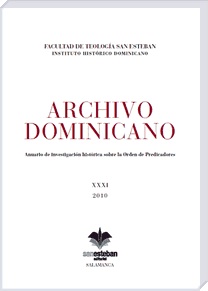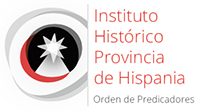About the Journal
Focus and scope
Archivo Dominicano (AD) is the annual journal published by the Historical Institute of the Province of

Hispania, Order of Preachers, since 1980. Its purpose is to be a scientific platform for researching and divulgation the history of the Dominicans in Spain and the other places where their friars carried out their mission over the centuries. For this reason, its cronology starts from the beginning of the 13th century until the present, and the geographical extension of its studies extends from Europe to America and Asia.
Arguments such as the history of preaching, art production for the convents, historiography or philosophical and theological polemics involving its members have a special importance in its pages, as this publication aims to extend its field of dissemination to all these areas of cultural studies.
Peer review process
The receipt of manuscripts does not imply its acceptance. First of all, authors will be notified upon receipt. Next, articles and notes will be peer-reviewed by members of the editorial committee and specialists on the subject.
Reviewers will remain anonymous and will issue a report considering the publication of the submitted manuscript, based on its originality, quality and relevance. Authors can receive a summary of the reports, if corrections and changes are required. It is not possible to make substantial or extensive adaptations.
The editorial committee will decide on the acceptance or rejection of the papers, and also on the time of its publication. If accepted, the author will receive a draft as a PDF file that must be corrected in a short period of time that will be set by the editors.
The journal editors can reject an article without the necessity of evaluating it, if they consider it does not follow the rules or fit the journal’s scope. The board is committed to tell the author whether the piece was rejected or accepted within a maximum period of six months.
Publication frequency
Annual publication in December, based on a single summary.
Open access policy
This journal provides immediate free access to its contents under the principle that making research freely available to the public supports a greater global exchange of knowledge.
This is an open access journal which means that all content is freely available without charge to the user or his/her institution. Users are allowed to read, download, distribute, print, reproduce parts, search or make a link to the full texts of the articles in this journal without asking prior permission from the editor or the author. It's licensed under a Creative Commons Attribution 4.0 Unported License.
Statement on publication ethics and misconduct
Publishers
Publishers should undertake to do the following:
- Clearly establish the relationship between publishers editors and other parties through a contract
- Promote editorial independence
- Respect privacy
- Protect intellectual property
- Maintain the integrity of published content
- Publish content punctually
Editors
- Decisions on publishing papers. After consulting the editorial board, journal editors decide whether or not to publish the papers submitted to their department, basing their decision on the reports made by two external reviewers and, in the case of significant disagreement between these, a third reviewer. They should apply the same criteria for accepting or rejecting all papers in accordance with their originality, academic importance and clarity. Editors must have systems in place for editorial decisions to be appealed against before the editorial board. They must also give full, up-to-date guidelines on authors' responsibilities and on the characteristics of papers sent to the journal.
- Non-discrimination. When examining submitted papers, editors should not take into account the authors' race, gender, sexual orientation, religion, ethnic origin, country of origin, citizenship or political views.
- Confidentiality. Editors and other journal employees should not reveal information about the papers received to anyone other than the authors themselves and the reviewers. They should ensure that throughout the process the anonymity of reviewers and authors is maintained at all times.
- Conflicts of interest and disclosure.Editors should not use results from papers submitted to them for their own research work without express permission from the author.
- Recognition of error. Editors should publish corrections, clarifications, retractions and apologies when necessary.
- Quality. Editors should elicit the opinions of authors, reviewers and the editorial board in order to improve the editorial process.
Authors
- Authorship of the text. Papers submitted should be signed by the author and by anyone else who has played a significant role in planning, organising, conducting or processing the research that the paper is reporting on. In cases of co-authorship, the author submitting the text should state explicitly that it contains the names of all the authors, and that these have given their approval to the final version of the paper, for publication in a UAB journal.
• Responsibility. Authors take full responsibility for the content of their manuscript.
• Plagiarism and originality.Authors should be prepared to declare that the paper submitted to the journal is original in each and all of its parts and that all sources used are correctly cited in it.
• Access and conservation of data. At the editors' request authors should clarify the sources or the data on which the research is based. These data should be kept for a reasonable time after publication, and may be disclosed if necessary.
• Multiple or repeated publication and conflicts of interest. Authors should not publish papers that present the same content in more than one journal at the same time.
• Conflicts of interest and disclosure. Authors should be prepared to declare that there is no conflict of interest that could affect the results of the research or the interpretations offered. They should also state sources of funding for the research, where applicable, and the name of the project their paper reports on.
• Errors in published papers. Authors who discover an important error or inaccuracy in a published paper should inform the journal editors and provide any information needed to make the necessary corrections.
Reviewers
- Peer review. It is used a system of double-blind review is to be adopted, which helps editors and the editorial board to make decisions on manuscripts submitted and at the same time gives authors an opportunity to improve their work.
• Meeting lead times. Having agreed to review a paper, reviewers should respect the lead times established. If unable to do so, they should give sufficient notice of this to the editors.
• Confidentiality. Papers under review are considered to be confidential documents, so the reviewers should not discuss them with third parties without the permission of the editors.
• Objectivity. Reviews should be carried out objectively. Reviewers should express their opinions on manuscripts appropriately and justify their conclusions.
• Bibliographic references. Reviewers should provide exact bibliographic data on works of importance in the paper's subject area that the author may have omitted. Reviewers should also inform editors about any similarities detected between the text under review and other works.
• Conflicts of interest and disclosure. Any restricted information obtained in the review process is considered confidential and may not be used for personal ends. If carrying out a review entails a conflict of interest for reviewers because they have collaborated or competed with the authors or the authors' institutions, these reviewers should decline the review proposal.
Sponsors
Journal history
Archivo Dominicano (AD), publication of historical research about the Order of Preachers, was born to be the organ of diffusion for the studies carried out by the Dominican Historical Institute of the Province of Spain (IHDOPE), an institution created by the Provincial Chapter of the Province of Spain of 1975.
The creation of this historical institute and the establishment of the provincial archives in the priory of San Esteban in Salamanca, the archival material kept there, the fact that increasingly more was being received from the convents of the Province, and from other entities and persons, led to the idea of publishing a journal. Thus it was that the first issue of AD appeared in 1980. Its first director (1980-1996) was the Dominican friar Ramón Hernández Martín, assisted at first by the Dominicans Antonio Gutiérrez (+1981) and Julián Merino. In 1981 Fr. José Barrado Barquilla joined the institute and in 1985 Fr. Lázaro Sastre Varas. Other collaborators in this first stage were Fr. Ángel Martínez Casado and Fray Iván Calvo Alonso. From 1996 to 2021 the second editor of AD was José Barrado Barquilla.
From 2005 the publication became an interprovincial magazine dependent on the Junta Ibérica de Provincias (JIP), a decision approved on 30 May 2004 by the provincials and councils of the five Dominican provinces in the Iberian Peninsula at that time.
In 2016 the province of Hispania was established and after the chapter of 2021 the Historical Institute of the Dominican Province of Hispania Order of Preachers, currently responsible for AD, was created.
Since its first issue, the publication has maintained its initial direction and objective: to be an organ of preferential scientific expression that makes known the history of the Order of Preachers from the 13th century to the present, with special emphasis on the Ibero-American-Philippine area. Archivo Dominicano remains the only Spanish-language annual devoted exclusively to the historical field of the Order of Preachers in the above-mentioned geographical area.





